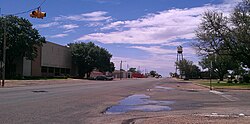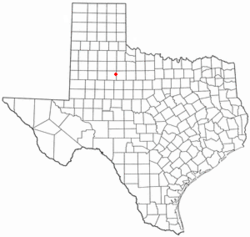Jayton, Texas | |
|---|---|
| Jayton, Texas | |
 Jayton's water tower and the Kent County Court in 2012 | |
| Motto: "Where pride makes the difference!” | |
 Location of Jayton, Texas | |
 | |
| Coordinates: 33°15′00″N100°34′28″W / 33.25000°N 100.57444°W | |
| Country | United States |
| State | Texas |
| County | Kent |
| Area | |
• Total | 1.69 sq mi (4.39 km2) |
| • Land | 1.69 sq mi (4.39 km2) |
| • Water | 0 sq mi (0.00 km2) |
| Elevation | 2,001 ft (610 m) |
| Population (2020) | |
• Total | 511 |
| • Density | 295.9/sq mi (114.23/km2) |
| Time zone | UTC-6 (Central (CST)) |
| • Summer (DST) | UTC-5 (CDT) |
| ZIP code | 79528 |
| Area code | 806 |
| FIPS code | 48-37468 [3] |
| GNIS feature ID | 2410136 [2] |
Jayton is a city in and the county seat of Kent County, Texas, United States. [4] It is located in the northeastern portion of the county, and the population was 511 as of the 2020 census.
